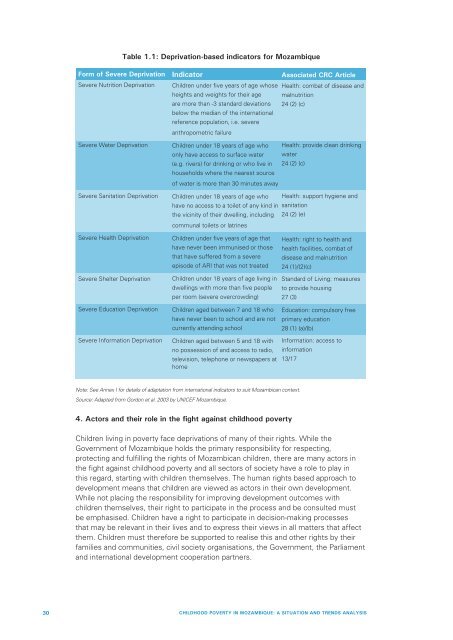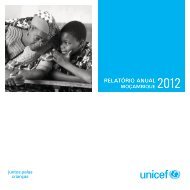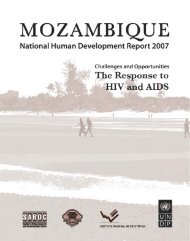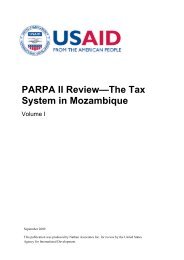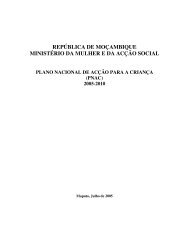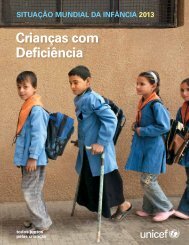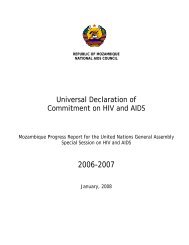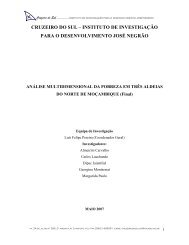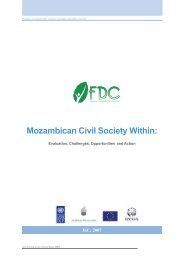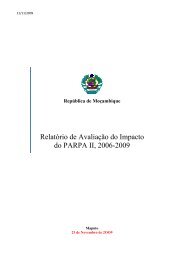Child Poverty in Mozambique. A Situation and Trend ... - Unicef
Child Poverty in Mozambique. A Situation and Trend ... - Unicef
Child Poverty in Mozambique. A Situation and Trend ... - Unicef
Create successful ePaper yourself
Turn your PDF publications into a flip-book with our unique Google optimized e-Paper software.
Table 1.1: Deprivation-based <strong>in</strong>dicators for <strong>Mozambique</strong><br />
Form of Severe Deprivation<br />
Severe Nutrition Deprivation<br />
Severe Water Deprivation<br />
Severe Sanitation Deprivation<br />
Severe Health Deprivation<br />
Severe Shelter Deprivation<br />
Severe Education Deprivation<br />
Severe Information Deprivation<br />
Indicator<br />
<strong>Child</strong>ren under five years of age whose<br />
heights <strong>and</strong> weights for their age<br />
are more than -3 st<strong>and</strong>ard deviations<br />
below the median of the <strong>in</strong>ternational<br />
reference population, i.e. severe<br />
anthropometric failure<br />
<strong>Child</strong>ren under 18 years of age who<br />
only have access to surface water<br />
(e.g. rivers) for dr<strong>in</strong>k<strong>in</strong>g or who live <strong>in</strong><br />
households where the nearest source<br />
of water is more than 30 m<strong>in</strong>utes away<br />
<strong>Child</strong>ren under 18 years of age who<br />
have no access to a toilet of any k<strong>in</strong>d <strong>in</strong><br />
the vic<strong>in</strong>ity of their dwell<strong>in</strong>g, <strong>in</strong>clud<strong>in</strong>g<br />
communal toilets or latr<strong>in</strong>es<br />
<strong>Child</strong>ren under five years of age that<br />
have never been immunised or those<br />
that have suffered from a severe<br />
episode of ARI that was not treated<br />
<strong>Child</strong>ren under 18 years of age liv<strong>in</strong>g <strong>in</strong><br />
dwell<strong>in</strong>gs with more than five people<br />
per room (severe overcrowd<strong>in</strong>g)<br />
<strong>Child</strong>ren aged between 7 <strong>and</strong> 18 who<br />
have never been to school <strong>and</strong> are not<br />
currently attend<strong>in</strong>g school<br />
<strong>Child</strong>ren aged between 5 <strong>and</strong> 18 with<br />
no possession of <strong>and</strong> access to radio,<br />
television, telephone or newspapers at<br />
home<br />
Associated CRC Article<br />
Health: combat of disease <strong>and</strong><br />
malnutrition<br />
24 (2) (c)<br />
Health: provide clean dr<strong>in</strong>k<strong>in</strong>g<br />
water<br />
24 (2) (c)<br />
Health: support hygiene <strong>and</strong><br />
sanitation<br />
24 (2) (e)<br />
Health: right to health <strong>and</strong><br />
health facilities, combat of<br />
disease <strong>and</strong> malnutrition<br />
24 (1)/(2)(c)<br />
St<strong>and</strong>ard of Liv<strong>in</strong>g: measures<br />
to provide hous<strong>in</strong>g<br />
27 (3)<br />
Education: compulsory free<br />
primary education<br />
28 (1) (a)/(b)<br />
Information: access to<br />
<strong>in</strong>formation<br />
13/17<br />
Note: See Annex I for details of adaptation from <strong>in</strong>ternational <strong>in</strong>dicators to suit Mozambican context.<br />
Source: Adapted from Gordon et al. 2003 by UNICEF <strong>Mozambique</strong>.<br />
4. Actors <strong>and</strong> their role <strong>in</strong> the fight aga<strong>in</strong>st childhood poverty<br />
<strong>Child</strong>ren liv<strong>in</strong>g <strong>in</strong> poverty face deprivations of many of their rights. While the<br />
Government of <strong>Mozambique</strong> holds the primary responsibility for respect<strong>in</strong>g,<br />
protect<strong>in</strong>g <strong>and</strong> fulfill<strong>in</strong>g the rights of Mozambican children, there are many actors <strong>in</strong><br />
the fight aga<strong>in</strong>st childhood poverty <strong>and</strong> all sectors of society have a role to play <strong>in</strong><br />
this regard, start<strong>in</strong>g with children themselves. The human rights based approach to<br />
development means that children are viewed as actors <strong>in</strong> their own development.<br />
While not plac<strong>in</strong>g the responsibility for improv<strong>in</strong>g development outcomes with<br />
children themselves, their right to participate <strong>in</strong> the process <strong>and</strong> be consulted must<br />
be emphasised. <strong>Child</strong>ren have a right to participate <strong>in</strong> decision-mak<strong>in</strong>g processes<br />
that may be relevant <strong>in</strong> their lives <strong>and</strong> to express their views <strong>in</strong> all matters that affect<br />
them. <strong>Child</strong>ren must therefore be supported to realise this <strong>and</strong> other rights by their<br />
families <strong>and</strong> communities, civil society organisations, the Government, the Parliament<br />
<strong>and</strong> <strong>in</strong>ternational development cooperation partners.<br />
30 CHILDHOOD POVERTY IN MOZAMBIQUE: A SITUATION AND TRENDS ANALYSIS


